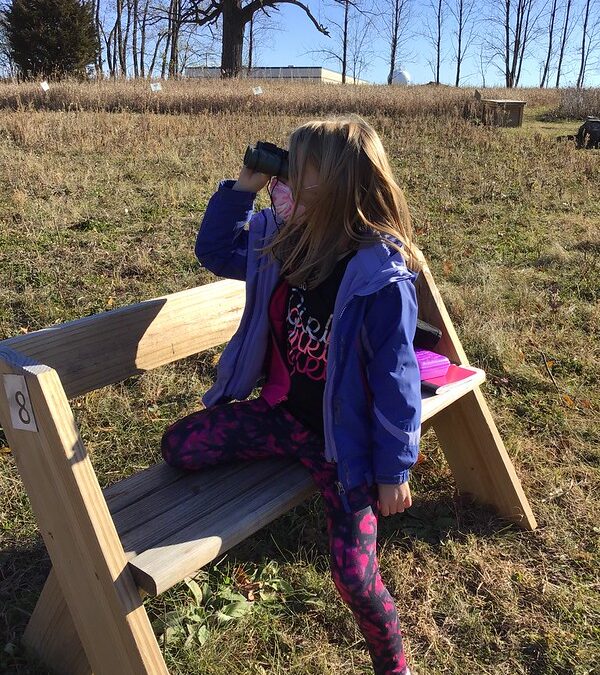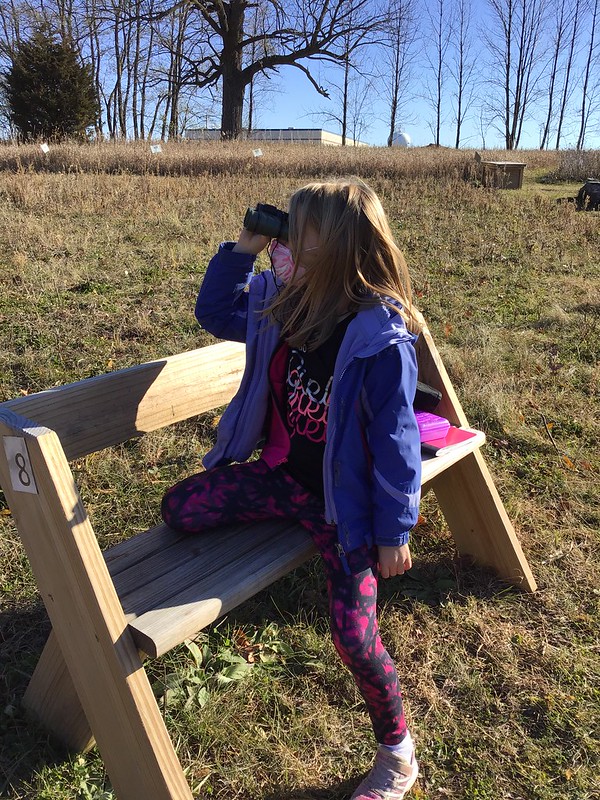
Kindergartners at Woodside Elementary enjoy using binoculars that were donated to their classroom thanks to NRF in partnership with Bird Collective in 2020. Photo: Peter Dargatz
Have you ever seen a bird through binoculars? Birding is a great way for people of any age or ability to get outside and observe nature. We can watch birds in the country and in the city, on a hike, from a bench, and even from our windows. Tools like binoculars help us get a closer look at wildlife in their natural habitat.
Thanks to a generous donation from our friends at Bird Collective, we’re able to help connect the next generation to our state’s birds by providing binoculars for Wisconsin classrooms!
Brooklyn-based Bird Collective is a small business that launched in 2019 to raise awareness of the threats to birds and raise money to support their conservation. They offer vintage-style birding apparel, eye-catching posters and stickers, and a patch club that features a new bird species each month. They also work to find and help fund projects that can create a better future for birds.
Bird Collective’s Binocular Fund was established to provide tools to future birders who don’t currently have access to them. Through their Binocular Fund, Bird Collective is partnering with the Natural Resources Foundation to outfit four Wisconsin schools with binoculars: Windsor Elementary School, Woodside Elementary School, Lincoln Avenue Elementary School, and Adams-Friendship Elementary School.
Thanks to this initiative, dozens of Wisconsin children now have access to binoculars, bringing birds a little bit closer, and hopefully sparking a new joy and interest the first time a child sees a bird through their new binoculars.
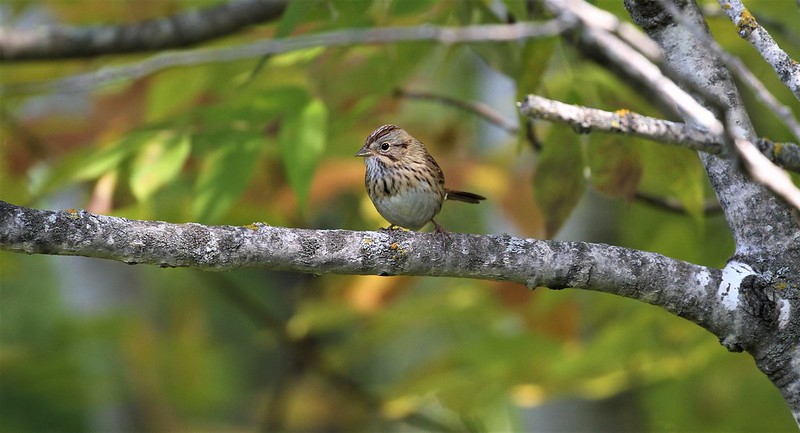
Lincoln’s Sparrow in Washburn, Bayfield County (Ryan’s yard) from 2020 Birdathon. Photo: Ryan Brady (Lake Superior eBirders team)
Benefits of Being Outside
We know that outdoor, nature-based learning provides numerous academic benefits for children, including greater classroom engagement, increased problem-solving confidence, and enhanced creativity.
It also improves mental and physical health outcomes, encourages environmental stewardship, deepens personal development, and strengthens communities. And birding is a wonderful gateway for children and adults alike to foster a connection to our natural world.
Dave Sisler is a fourth-grade teacher from Windsor Elementary School in DeForest, one of the schools that received binoculars through this initiative. His firsthand experience confirms the benefits of getting students outside and connecting with nature.
“Learning in the outdoors improves student behavior and engagement even when we return to the classroom,” Sisler said. “Kids love feeling connected to the natural world and find that they have strengths they never knew were of value. Quieter students become impassioned with birding! Because of birding, we feel more connected as a class and with our planet.”
Dave says that watching kids learn how to use binoculars can be comical. “Most fourth-graders have never used a proper pair of binoculars,” he said. “They look through the wrong end. They forget that the focus is not automatic. And most commonly, they need reminders to adjust the eye width. It’s really satisfying when they start seeing objects (namely birds) up close for the first time!”
Sisler also gets his students involved with the Great Wisconsin Birdathon, the Natural Resources Foundation’s annual fundraiser for bird conservation, and he says that the conservation angle provided depth to his bird-watching school unit. “Kids love to help. The Great Wisconsin Birdathon gave them the means to protect precious habitat as beginner bird watchers. Because of this experience I hope my students will always regard birding and conservation as one passion.”
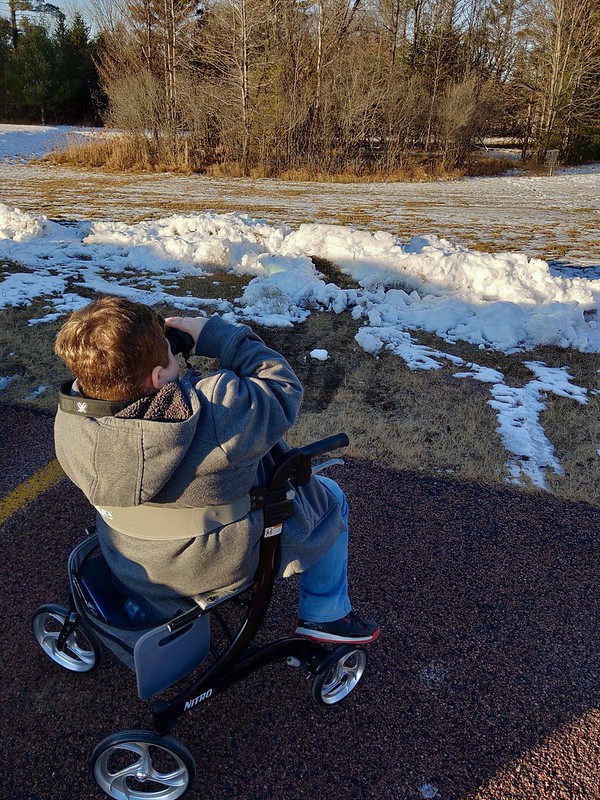
Eighth grade students from Adams-Friendship Middle School spot fall migratory birds using new binoculars. A grant from the Go Outside Fund in 2019 helped staff purchase ten pairs of binoculars for the 8th Grade Science Explore class. Photo credit: Marcus Seevers
Outfitting Future Generations of Conservationists
Sandy Benton is a co-founder of FIELD Edventures, one of the partner organizations that NRF works with on environmental education.
FIELD Edventures is a unique program that works directly with teachers and administrators to build environmental education holistically into schools. Sandy is currently working with Adams-Friendship Elementary and Lincoln Avenue Elementary School, two of the schools that received binoculars for students. “For kids, it’s important that they get real tools when they are studying natural resources. We need to honor children and give them the opportunity to be in the field like a real scientist or birder. Having these binoculars allows that to happen.”
Dave Sisler agrees, “Kids are so curious. Give them the tools, the time, and a little guidance, then get out of the way! They thrive on the many joys of birding. Just like adults, kids love seeking, observing, identifying, journaling, and further investigating birds.”
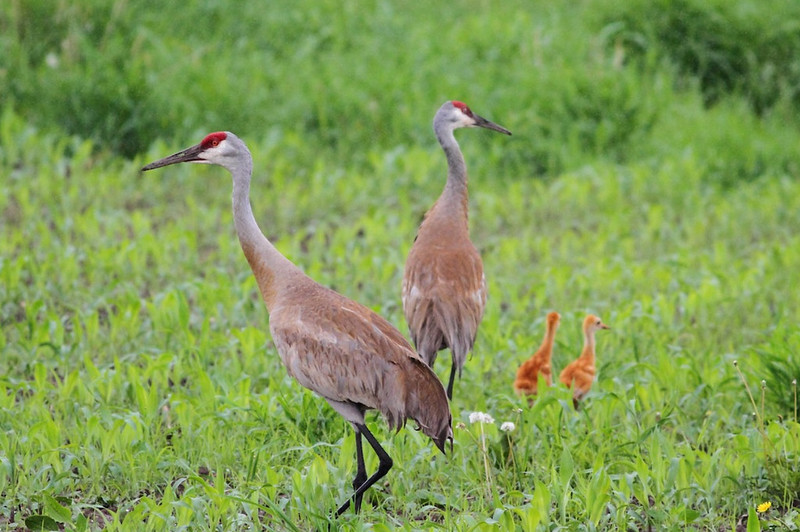
Sandhill Cranes and young spotted during a Wisconsin Breeding Bird Atlas II survey. NRF has provided funding for the WBBAII through the Bird Protection Fund. Photo: Brian Collins
Adapting to COVID-19
During the pandemic, schools are finding ways to adapt, where having a tool like binoculars is a great resource.
“We’re looking at ways that we can provide a little bit of practice and content online and then we’ll tell the kids, ‘Now we’re going to take a screen break. Take your journal and binoculars and sit quietly, and this is what we want you to observe,” Sandy said. “Even though we’re not outside in one location, we’re still outside together, just separately.”
She also noted the different ways that children connect with birds: “Some kids will engage from an artistic or creative aspect, like the beauty – and some kids are fascinated by the ecological concepts and science behind birds.”
With many students currently learning from home due to the pandemic, it is more important than ever for them to find ways to spend time outdoors and connect to the natural world.
Help us be here #FortheBirds! There are many ways you can support bird conservation in Wisconsin. Join a team during the annual Great Wisconsin Birdathon or attend a Field Trip to see some of the rarest bird species in our state. You can also become a member of the Natural Resources Foundation. Your gifts support our grantmaking efforts like the Bird Protection Fund, which has invested over $1 million in Wisconsin bird conservation since it was formed in 2009. Every action makes a difference in protecting our birds.
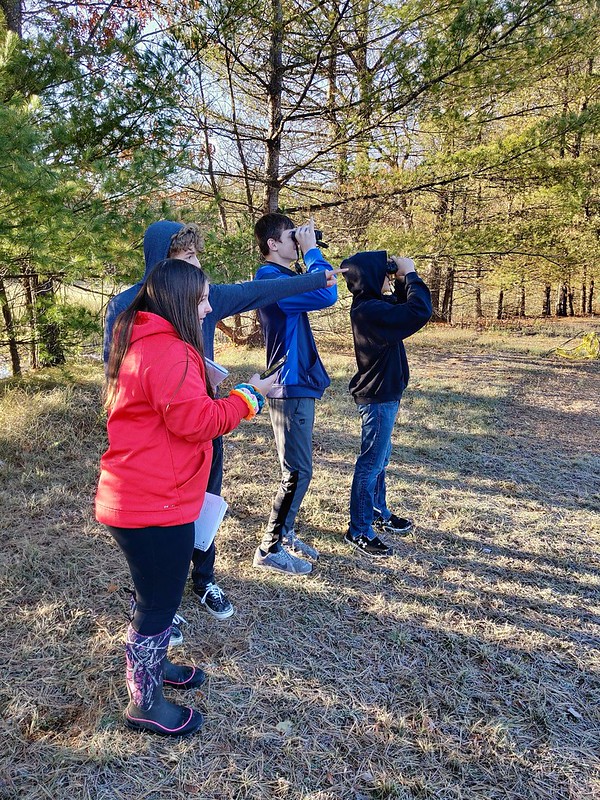
Eighth grade students from Adams-Friendship Middle School spot fall migratory birds in an early morning using new binoculars. A grant from the Go Outside Fund in 2019 helped staff purchase ten pairs of binoculars for the 8th Grade Science Explore class. Photo credit: Marcus Seevers
Written by Lindsey Taylor, Grants Assistant
About Bird Collective
Brooklyn-based Bird Collective is a small business that launched in 2019 to raise awareness of the threats to birds and raise money to support their conservation. They offer vintage-style birding apparel, eye-catching posters and stickers, and a patch club that features a new bird species each month. They also work to find and help fund projects that can create a better future for birds.
